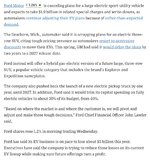Well, consider the news sources -- CNN vs. the WSJ. I'm sure both are probably correct, given whatever they are counting to add up to those numbers. The $1.9B number comes from the $400MM write-down + $1.5B in additional expenses as reported. That equals $1.9B to me (rounding up to $2B).
I doubt the WSJ's news operation is going to embellish or falsify the number.
I will say that CNN is a far more partisan operation than the WSJ's NEWS operation (not talking about their opinion page, which is decidedly right-leaning). CNN is a left-leaning news organization, through and through, and the slant of their coverage of any/every type (political, business, society, crime, and so forth) reflects that on both the online and broadcast side.
WSJ's news reporting operation is pretty much right up the middle. As said, WSJ opinion page is right/conservative.
I trust the WSJ to report business news (and all news) fairly and evenly, in all situations.
That said, here is the entire WSJ article.
Ford Shrinks Its EV Rollout Plans as Demand Lags
Automaker cancels large electric SUV and expects to take $1.9 billion in related special charges and write-down
Updated Aug. 21, 2024 11:14 am ET
 Ford CEO Jim Farley during a 2021 presentation on the Tennessee factory to build electric trucks and batteries. Photo: Mark Humphrey/Associated Press
Ford Motor
Ford CEO Jim Farley during a 2021 presentation on the Tennessee factory to build electric trucks and batteries. Photo: Mark Humphrey/Associated Press
Ford Motor is canceling plans for a large electric sport-utility vehicle and expects to take $1.9 billion in related special charges and write-downs, as automakers
continue adjusting their EV plans because of
softer-than-expected demand.
The Dearborn, Mich., automaker said it is scrapping plans for an electric three-row SUV, citing tough pricing pressure as automakers
resort to aggressive discounts to move their EVs. This spring, Ford had said it
would delay the plans by two years to a 2027 release date.
Ford instead will offer a hybrid gas-electric version of a future large, three-row SUV, a popular vehicle category that includes the brand’s Explorer and Expedition nameplates.
The company also pushed back the launch of a new electric pickup truck by one year, until 2027. In addition, Ford said it would trim its capital spending on fully electric vehicles to about 30% of its budget, from 40%.
“Based on where the market is and where the customer is, we will pivot and adjust and make those tough decisions,” Ford Chief Financial Officer John Lawler said.
Ford shares rose 1.2% in morning trading Wednesday.
Ford has said its EV business is on pace to lose about $5 billion this year. Executives have said the company is trying to reduce those losses on its current EV lineup while making sure future offerings turn a profit.
Carmakers are trying to strike a
tricky balance on electric vehicles. Tougher tailpipe-emissions rules, along with the
rapid rise of Chinese EV makers, are pressuring them to invest in the technology. But consumer interest in EVs has waned after a burst of enthusiasm.
For example, while Ford is recalibrating its plans to include more hybrids, it also is moving ahead with the rollout of several full EVs. It will start making an electric commercial van in 2026 and two new pickup trucks a year later.
One of the trucks will be a midsize pickup, built using a new, lower-cost EV system that has been under development for nearly two years by a team of about 100 Ford engineers in Irvine, Calif. Led by former Tesla executive Alan Clarke, that project is designed to produce several electric models that Ford says will be profitable and allow the company to compete with Chinese EV makers.
Ford Chief Executive Jim Farley has said that China’s EV companies have the advantage of a lower-cost supply chain and that Ford needs to find ways to lower its own costs to compete.
“We believe that the fitness of the Chinese in EVs will eventually wash over our entire industry in all regions,” Farley told analysts last month.
Ford said it would take a special, noncash charge of $400 million to write down expenses related to the cancellation of the electric SUV. The move also may result in additional expenses of $1.5 billion, which would be reflected as special items in future quarters, the company said.
General Motors and other traditional automakers also
have pulled back or delayed some EV investments, citing slower-than-expected demand for vehicles that run on batteries alone.
Meanwhile, sales of hybrid vehicles
have risen sharply over the past year, and many automakers have said they
plan to roll out more of them as an interim step for customers who aren’t ready to make the leap to a fully electric model.
Write to Mike Colias at
mike.colias@wsj.com
Corrections & Amplifications
Ford said this spring that it would delay plans for an electric three-row SUV by two years to a 2027 release date. An earlier version of this article incorrectly said the company was General Motors. (Corrected on Aug. 21.)

 ...... > 2.20 €/liter translates into >9 US$/gallon.......and that's not even the "rally 102" octane gasoline. Still, no way on earth will I be considering owning & driving an EV any time soon, no matter what tax incentives are on offer, and no matter how easy E-filling on the road will be. And if so, in a zillion years when forced to by the government, no way on earth will that be a Chinese make, not in my life time (sorry, no offense meant)
...... > 2.20 €/liter translates into >9 US$/gallon.......and that's not even the "rally 102" octane gasoline. Still, no way on earth will I be considering owning & driving an EV any time soon, no matter what tax incentives are on offer, and no matter how easy E-filling on the road will be. And if so, in a zillion years when forced to by the government, no way on earth will that be a Chinese make, not in my life time (sorry, no offense meant)



 I'd go along with the idea that the EV love affair is very niche and will remain so for quite a few years (maybe decades, barring technology/power breakthroughs of an order of magnitude or greater).
I'd go along with the idea that the EV love affair is very niche and will remain so for quite a few years (maybe decades, barring technology/power breakthroughs of an order of magnitude or greater).





















